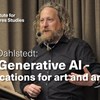implication
A talk on implications of self driving vehicles
Listen to our Director Gustaf Arrhenius'talk "Ethical, legal and political implications of self driving vehicles", held at the Transport Initiative Seminar at Chalmers University of Technology in Gothe
Implications of climate change for policing practice worldwide
Venue: Institute for Futures Studies, Holländargatan 13 in Stockholm, or online Welcome to a seminar arranged in collaboration with two visiting researchers from the Hague University of Applied Science,

Big generative AI - Implications for creativity, art, and artists
Research seminar with Palle Dahlstedt, Professor in Interaction Design at Gothenburg University. In this lecture, Palle Dahlstedt will share a pragmatic, critical, and visionary view of what machine l
The implications of learning across perceptually and strategically distinct situations
Synthese, 1-18. Abstract Game theory is a formal approach to behavior that focuses on the strategic aspect of situations. The game theoretic approach originates in economics but has been embraced by sch
Refusing to acknowledge the problem: Interests of the few, implications for the many.
In: G. Sosa-Nunez, & E. Atkins (Eds). E-IR Edited Collections: Environment, climate change and international relations. E-International Relations Publishing. Read more about Edited Collection – Envi
Towards Common European Health Policies: What are the Implications for the Nordic Countries?
This paper reviews the contents of emerging EU policies in the area of health and discusses their implications for the Nordic health care systems. A central question is whether any coherent, common Eu
Modes of Re-Territorialisation: Spatial Implications of Regional Competition Politics in Sweden
In Sweden, efforts to develop knowledge based niches have become key elements in an increasingly growth oriented regional/industrial policy. This paper addresses the spatial implications of these chan
Limited and Mixed Evidence for System-Sanctioned Change to Protect the Environment: A Replication Study
International review of social psychology, vol 37:1 Abstract Feygina and colleagues (2010, Study 3) reported that people who prefer the status quo can be encouraged towards pro-environmental responses w
Committing to Priorities: Incompleteness in Macro-Level Health Care Allocation and Its Implications
Journal of Medicine and Philosophy 43: 724-745. Abstract This article argues that values that apply to health care allocation entail the possibility of “spectrum arguments,” and that it is plausible that
Deep learning diffusion by infusion into preexisting technologies - Implications for users and society at large
in: Technology in Society. 63, 101396 Abstract:Artificial Intelligence (AI) in the form of Deep Learning (DL) technology has diffused in the consumer domain in a unique way as compared to previous gene, i.e., by being added to preexisting technologies that are already in use. We find that DL-algorithms for recommendations or ranking have been infused into all the 15 most popular mobile applications (apps) in the U.S. (as of May 2019). DL-infusion enables fast and vast diffusion. For example, when a DL-system was infused into YouTube, it almost immediately reached a third of the world's population. We argue that existing theories of innovation diffusion and adoption have limited relevance for DL-infusion, because it is a process that is driven by enterprises rather than individuals. We also discuss its social and ethical implications. First, consumers have a limited ability to detect and evaluate an infused technology. DL-infusion may thus help to explain why AI's presence in society has not been challenged by many. Second, the DL-providers are likely to face conflicts of interest, since consumer and supplier goals are not always aligned. Third, infusion is likely to be a particularly important diffusion process for DL-technologies as compared to other innovations, because they need large data sets to function well, which can be drawn from preexisting users. Related, it seems that larger technology companies comparatively benefit more from DL-infusion, because they already have many users. This suggests that the value drawn from DL is likely to follow a Matthew Effect of accumulated advantage online: many preexisting users provide a lot of behavioral data, which bring about better DL-driven features, which attract even more users, etc. Such a self-reinforcing process could limit the possibilities for new companies to compete. This way, the notion of DL-infusion may put light on the power shift that comes with the presence of AI in society.








